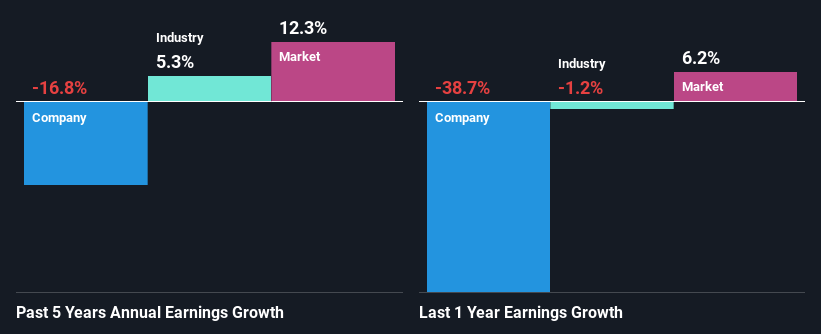Does Shopping Centres Australasia Property Group's (ASX:SCP) Weak Fundamentals Mean A Downturn In Its Stock Should Be Expected?
Shopping Centres Australasia Property Group's (ASX:SCP) stock is up by 5.5% over the past three months. However, in this article, we decided to focus on its weak financials, as long-term fundamentals ultimately dictate market outcomes. In this article, we decided to focus on Shopping Centres Australasia Property Group's ROE.
Return on equity or ROE is an important factor to be considered by a shareholder because it tells them how effectively their capital is being reinvested. Put another way, it reveals the company's success at turning shareholder investments into profits.
Check out our latest analysis for Shopping Centres Australasia Property Group
How To Calculate Return On Equity?
Return on equity can be calculated by using the formula:
Return on Equity = Net Profit (from continuing operations) ÷ Shareholders' Equity
So, based on the above formula, the ROE for Shopping Centres Australasia Property Group is:
4.0% = AU$98m ÷ AU$2.4b (Based on the trailing twelve months to December 2020).
The 'return' is the amount earned after tax over the last twelve months. Another way to think of that is that for every A$1 worth of equity, the company was able to earn A$0.04 in profit.
What Is The Relationship Between ROE And Earnings Growth?
So far, we've learned that ROE is a measure of a company's profitability. Depending on how much of these profits the company reinvests or "retains", and how effectively it does so, we are then able to assess a company’s earnings growth potential. Assuming everything else remains unchanged, the higher the ROE and profit retention, the higher the growth rate of a company compared to companies that don't necessarily bear these characteristics.
Shopping Centres Australasia Property Group's Earnings Growth And 4.0% ROE
On the face of it, Shopping Centres Australasia Property Group's ROE is not much to talk about. We then compared the company's ROE to the broader industry and were disappointed to see that the ROE is lower than the industry average of 6.7%. For this reason, Shopping Centres Australasia Property Group's five year net income decline of 17% is not surprising given its lower ROE. We believe that there also might be other aspects that are negatively influencing the company's earnings prospects. For example, it is possible that the business has allocated capital poorly or that the company has a very high payout ratio.
So, as a next step, we compared Shopping Centres Australasia Property Group's performance against the industry and were disappointed to discover that while the company has been shrinking its earnings, the industry has been growing its earnings at a rate of 5.3% in the same period.
The basis for attaching value to a company is, to a great extent, tied to its earnings growth. It’s important for an investor to know whether the market has priced in the company's expected earnings growth (or decline). This then helps them determine if the stock is placed for a bright or bleak future. Is SCP fairly valued? This infographic on the company's intrinsic value has everything you need to know.
Is Shopping Centres Australasia Property Group Efficiently Re-investing Its Profits?
Shopping Centres Australasia Property Group seems to be paying out most of its income as dividends judging by its three-year median payout ratio of 88% (meaning, the company retains only 12% of profits). However, this is typical for REITs as they are often required by law to distribute most of their earnings. So this probably explains the company's shrinking earnings.
In addition, Shopping Centres Australasia Property Group has been paying dividends over a period of eight years suggesting that keeping up dividend payments is preferred by the management even though earnings have been in decline. Our latest analyst data shows that the future payout ratio of the company over the next three years is expected to be approximately 87%. Regardless, the future ROE for Shopping Centres Australasia Property Group is predicted to rise to 7.3% despite there being not much change expected in its payout ratio.
Conclusion
Overall, we would be extremely cautious before making any decision on Shopping Centres Australasia Property Group. Because the company is not reinvesting much into the business, and given the low ROE, it's not surprising to see the lack or absence of growth in its earnings. Having said that, looking at current analyst estimates, we found that the company's earnings growth rate is expected to see a huge improvement. To know more about the latest analysts predictions for the company, check out this visualization of analyst forecasts for the company.
This article by Simply Wall St is general in nature. It does not constitute a recommendation to buy or sell any stock, and does not take account of your objectives, or your financial situation. We aim to bring you long-term focused analysis driven by fundamental data. Note that our analysis may not factor in the latest price-sensitive company announcements or qualitative material. Simply Wall St has no position in any stocks mentioned.
Have feedback on this article? Concerned about the content? Get in touch with us directly. Alternatively, email editorial-team (at) simplywallst.com.

 Yahoo Finance
Yahoo Finance 
